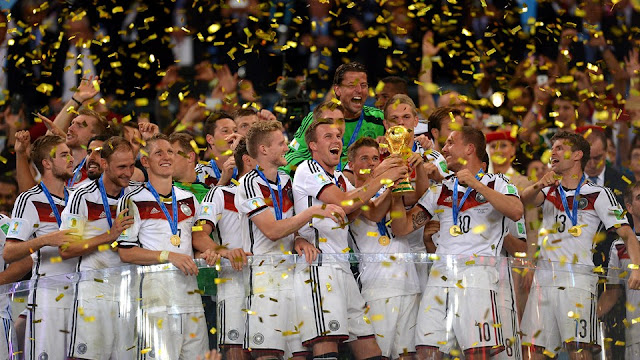What makes one team of 11 men superior to another team
of 11 in the field of play? Many ardent football watchers have always wondered.
Is the coach a differentiating factor on the field of play considering he or
she is stuck on the sidelines when the game starts? What makes a team like
Barcelona or Real Mardrid able to exhibit superior performance from year to
year?
 |
| Source: Daily News |
Football is a team game where at the beginning of
every game, each team seems to be equally matched. Each side has 11 men with a
referee in the middle. The referee’s job is to ensure fair play and make sure no
team has an unfair edge or even cheats.
Despite the equal platform given to all teams, some
teams have consistently over the years excelled, while other teams haven't. This has raised the question of what makes a team perform better than the other.
A good example is the German team that won the last World Cup in Brazil. To
emerge champions, they won all its matches though, none of the players in the German team
won the golden ball or golden boot they went home with the most important trophy in the competition-The
World Cup.
Also, Germany’s winning coach, Joachim Löw was not the
highest paid coach in Brazil in 2014. The honour went to Russian Coach, Fabio
Capello; who earns $11,235,210 (763 times more than an average wage in
Russia). Fabio's team however exited the World Cup in the group stages despite
his huge salary.
The word “team” is always associated with the slogan
“Together Everyone Achieves More”. This is true if the team does more than
having it as a slogan. It is the level of collaboration in a team that makes it
successful.
Every business or non-business establishment is a
team, though with sub-teams. Every team has a leader who is not necessarily the
highest ranked officer in the team. Some studies have revealed some of the
characteristics that can make any team excel. These characteristics include:
Team Leadership: A leader in a team is someone
who fixes his eyes on the team’s objective or goals. He or she is someone who is
driven by the achievement of the team’s goals and steers the team towards those
goals. The appointed leader must therefore be a coach who understands the
individual team members. The ultimate leader must be emotionally intelligent to
lead and maximize the potentials of the team.
Communication: A team must have seamless communication within the team. There must not be information gap within the
team, to reduce friction and confusion. One important aspect of communication
within the team is giving credit and reward to the team members.
Connection: Team connection is both at the personal and professional levels. A team
lead must connect with his team- he or she is better off if he touches the
heart before asking for the hands. Touching the heart is often a product of
mutual respect and treatment of the team members. Team members must also
connect with each other, understand each other’s needs and move in to fill it
when a gap is noticed.
Value Contributions: Every team has different parts. For a football team, there is the defence,
midfield and attack. For a team to perform optimally, the linkages between all
the parts must be smooth. It is the
ability of the team lead and members to see the need to be timely contributors
into the next phase of the process that determines the outcome. An attack must
move smoothly from defence. Every team member must play his or her role
effectively to make the team excel.
Emotional
intelligence: The ability of the team members to be aware of their
emotions, manage their emotions and use their emotions in the best interest of
the team is essential. Most often, lack of emotional intelligence in a team leads
to indiscipline and disruption of the cohesion in the team. The level of the
team’s emotional intelligence is a key factor in setting priorities and
reacting to any changes in the external environment.
By Ola Babs-Olugbemi





Team leadership and communication is a way out of an interlocutor's block. Students usually call it "talking chance", when one of the group breaks the ice. Get more information about communication strategies in the essay tips on ResearchPaperWritings (college group).
ReplyDeleteI regularly visit your site and find a lot of interesting information. Not only good posts but also great comments spanish to english
ReplyDeleteGreat article. I enjoyed your post. Good collaborative understanding will give a high value.
ReplyDeleterun 3 online
It's hard for me to collaborate with people. But I am working on it. Feel free to check https://paperovernight.com/blog/research-paper-introduction my website now.
ReplyDeleteTeam work is important for the success of any organization. When I started my work for online shopping providing the captain america leather jacket collection. It was difficult for me to manage the work. I do not have many employees then I hired employees and make teams for work. Collaboration allows the team members to work on the same platform.
ReplyDeleteThis copyediting service is the best you'll ever find. Check it out right know.
ReplyDeletePLEASE READ!!Hello Guys!!! I am Caro I live in Ohio USA I’m 32 Years old, am so happy I got my blank ATM card from Adriano. My blank ATM card can withdraw $4,000 daily. I got it from Him last week and now I have withdrawn about $10,000 for free. The blank ATM withdraws money from any ATM machines and there is no name on it because it is blank just your PIN will be on it, it is not traceable and now I have money for business, shopping and enough money for me and my family to live on.I am really glad and happy i met Adriano because I met Five persons before him and they could not help me. But am happy now Adriano sent the card through DHL and I got it in two days. Get your own card from him right now, he is giving it out for small fee to help people even if it is illegal but it helps a lot and no one ever gets caught or traced. I’m happy and grateful to Adriano because he changed my story all of a sudden. The card works in all countries that is the good news Adriano's email address is adrianohackers01@gmail.com
ReplyDeletePLEASE READ!!Hello Guys!!! I am Caro I live in Ohio USA I’m 32 Years old, am so happy I got my blank ATM card from Adriano. My blank ATM card can withdraw $4,000 daily. I got it from Him last week and now I have withdrawn about $10,000 for free. The blank ATM withdraws money from any ATM machines and there is no name on it because it is blank just your PIN will be on it, it is not traceable and now I have money for business, shopping and enough money for me and my family to live on.I am really glad and happy i met Adriano because I met Five persons before him and they could not help me. But am happy now Adriano sent the card through DHL and I got it in two days. Get your own card from him right now, he is giving it out for small fee to help people even if it is illegal but it helps a lot and no one ever gets caught or traced. I’m happy and grateful to Adriano because he changed my story all of a sudden. The card works in all countries that is the good news Adriano's email address is adrianohackers01@gmail.com
ReplyDeletePLEASE READ!!Hello Guys!!! I am Caro I live in Ohio USA I’m 32 Years old, am so happy I got my blank ATM card from Adriano. My blank ATM card can withdraw $4,000 daily. I got it from Him last week and now I have withdrawn about $10,000 for free. The blank ATM withdraws money from any ATM machines and there is no name on it because it is blank just your PIN will be on it, it is not traceable and now I have money for business, shopping and enough money for me and my family to live on.I am really glad and happy i met Adriano because I met Five persons before him and they could not help me. But am happy now Adriano sent the card through DHL and I got it in two days. Get your own card from him right now, he is giving it out for small fee to help people even if it is illegal but it helps a lot and no one ever gets caught or traced. I’m happy and grateful to Adriano because he changed my story all of a sudden. The card works in all countries that is the good news Adriano's email address is adrianohackers01@gmail.com
ReplyDelete"DO YOU KNOW THAT YOU CAN HACK AN ATM MACHINE WITH PROGRAMMED BLANK ATM CARD?? This card is an ATM cards that can be used to hack into any ATM machine. Withdraw as much cash as you want!! We sell this cards to buyers worldwide. We also make credit cards too! Here is our list for ATM cards:
ReplyDelete$10————-$10,000
$10 ————$20,000
$10 ————$30,000
$10 ————$40,000
Those cards are programed to withdraw for 3 months before you can renew it, if you want to get your own card Contact us on Email: adrianohackers01@gmail.com"
Download coc hacked apk new version end install!
ReplyDeletehttps://apkgreat.com/clash-of-clans-mod-apk/
Assalamu'alaikum
ReplyDeleteAre you in need of Urgent Loan Here no collateral required all problem regarding Loan is solve between a short period of time and duration more than 20 years what are you waiting for apply now and solve your problem or start a business with Loan paying of various bills I think you have come to the right place just 2% interest rate. Contact Us Via.email: abdullahibrahimlender@gmail.com
whatspp Number +918929490461
Mr Abdullah Ibrahim
Assalamu'alaikum
ReplyDeleteAre you in need of Urgent Loan Here no collateral required all problem regarding Loan is solve between a short period of time and duration more than 20 years what are you waiting for apply now and solve your problem or start a business with Loan paying of various bills I think you have come to the right place just 2% interest rate. Contact Us Via.email: abdullahibrahimlender@gmail.com
whatspp Number +918929490461
Mr Abdullah Ibrahim